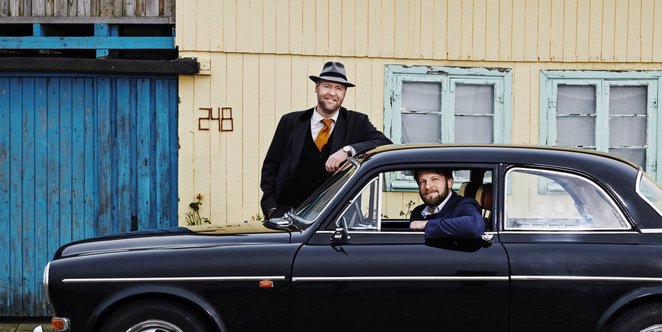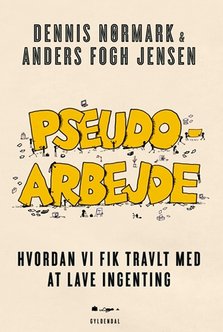Dennis Nørmark
According to Gallup, in Western Europe, there are nearly half as many actively unengaged workers (24%) than actively engaged workers (13%).
A significant part of all employees (63%) are generally disinterested in their work.
A British study shows that 37% of the informants said that their work doesn't contribute with anything valuable to the world.
The most visited Danish and foreign websites which deal with private retail receive the largest number of visitors on Mondays from 9.00 AM – 16.00 PM.
Research shows that along with us talking more about being busy we see a decrease in the amount of work that is actually available to us.
What keeps us so busy?
Extracts from the book
'In reality, we could be spending half the day on the beach. If we simply put our minds to it, we did not have to work in the morning, just in the afternoon.'
Mette, EXEC.
'I produce an annual report for Group management at my company. In the report, I gather information about the different sections. My colleague and I spend about a third of the work year on it.' Kirsten leans across the desk and whispers to us 'and it is a complete waste of time.'
Kirsten, Communications Consultant.
'Suddenly it was January second, and I had an entire PR Team with nothing to do (...) I couldn't very well ask them to go home, so I spent a lot of money trying to get them working with all kinds of ridiculous tasks.'
Steve, Director of Marketing.
Pseudo-work
What is it and how do we get rid of it?
In my opinion pseudo-work is the greatest obstacle to overcome in order to access real and deep felt contentment with our work life, and life in general, and to be able to release the innovation and creativity that goes to waste when well-educated people waste their own and others' time with self-made tasks that lack any real value. We might have made our work processes more efficient, but at the same time we are now creating more work and putting new tasks at the forefront. We keep records, register, follow policies and procedures, write reports, evaluate, perform quality control and analysis, audit, control, write internal proposals, make PowerPoint presentations while spending on average ten hours writing and answering e-mails, attending an overwhelming amount of meetings of which fewer and fewer people see the point.
The problem is that we know that these tasks are redundant because in the past we have managed perfectly fine without them. In our defense, we say that things are more complicated now, but forget that we are the ones who have made it so. It is not a given that it has to be this complicated.
In other words, we are drowning in unnecessary work and wanting to spend more time with our families, all the while 430,000 Danes are on sick leave due to stress.
Ridding ourselves of pseudo-work is, in fact, easier than you would think. In our book 'Pseudo-work – how we became busy doing nothing,' philosopher Anders Fogh Jensen and I describe why we ended up believing that something so silly was smart, what pseudo-work is, and what you and your organisation can do about it.
But seeing as time is scarce because it has to be filled with controlling, time registering, strategic meetings, writing annual reports which no one reads, you can get the distilled version of the book in a talk where the headlines could be:
What does pseudo-work look like in our organisation?
What signifies pseudo-work and does it apply to you and your colleagues' work lives? What is the nature of pseudo-work and how is it possible that some kinds of tasks can simulate work without being actual work? In which parts of the organisation is pseudo-work typically hiding, and which types of pseudo-work can be found there?
How do we train the eye to notice pseudo-work, reveal it, and practice posing more critical questions regarding the nature of each others' work?
Why do we encounter pseudo-work?
No one produces pseudo-work out of ill will; in fact, it often comes to life through the best of intentions. But the reasons don't matter, because pseudo-work itself is a part of the problem. The cure for pseudo-work is often counterintuitive: for example, a lot of pseudo-work see the light of day, not due to low ambitions, but because the aspirations are too high. Pseudo-work often arises because we seek to solve a problem with a solution that ends up costing so much effort and money that it gets in the way of the actual work.
In this talk, we examine all the sets of 'rationalities' that we use to create pseudo-work, but which are in fact highly irrational. We look at the tendency of a lot of organisations that tend to overestimate their own significance and the mindless imitation of the practices of other organisations along with the lack of insight into the bureaucratic monsters that the organisations have created for themselves.
How do we rid ourselves of pseudo-work?
One of the greatest benefits that come from exposing pseudo-work is the revelation that we don't have to work as much as we think. For most of us, the real value we generate is created in a much shorter time span than the hours we are paid for. Therefore a part of the solution is that we pay people for the value of their work instead of the number of hours they spend at work. Calculating pay by work hours is a remnant of the early industrial era, which is no longer needed in most modern organisations. Another solution is to cultivate a critical stance against how much time we spend obstructing each others' work with distractions that hinder the flow of creativity. In order to eliminate self-imposed and mindless work tasks, it is necessary that we each have the courage to admit that we are participating in it and for leaders and heads of departments to step up and take the lead in several different areas.
Target audience
The target audience for the talk on pseudo-work is both private and public organisations who suspect that pseudo-work is happening in their organisation or who are merely curious to learn more about the phenomenon and how to get ahead of the problem. The talk can be tailored to suit your needs or simply base itself on the essential points of the book.
Contact me by phone or mail, and I will provide you with the talk that best suits your needs.
You will be amazed, provoked and your everyday life is guaranteed to change forever!

